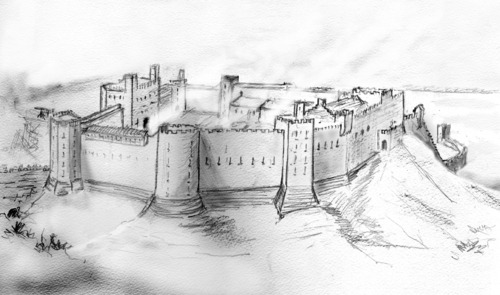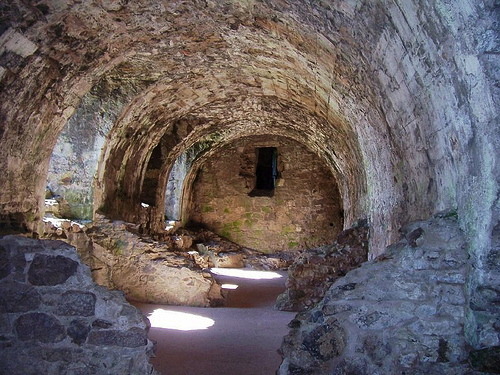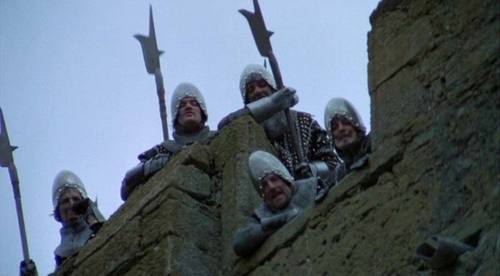Checking my facts about Berwick’s changing nationality for a new exhibition, I thought I’d share the strangest story of an attack on Berwick Castle which occurred on 25th November, 1378.

Berwick Castle from the north in the 14th century. If the Scots undermined the walls into a cellar it may have been under the west wall (to the right) under the Great Hall.
The original chronicles telling the story conflict in some areas but let that pass. The basic facts are that about 48 Scots take the castle which was obviously not well defended and the Constable (in charge of the castle), Sir Robert de Boynton was killed in the attack.
Thomas Walsingham’s Historia Anglicana is a contemporary account and tells us that:
“…furtively entered Berwick castle by night, by a window in a tower, and finding the constable of the castle, Sir Robert de Boynton, an active knight, unprepared there, they killed him; but they allowed his wife and children, and other members of his household, to leave, on condition of paying them three thousand marks within the next three weeks…”
Froissart’s Chronicles relate how a spy was sent first and reporting that the castle was badly defended, Alan Ramsay and his men scaled the walls with ladders. They then battered down Sir Robert de Boynton’s chamber door. Sir Robert tries to escape by jumping out of a window and in so doing breaks his neck.
My favourite version (who could say which is correct), The Anonimalle Chronicle says that Sir Robert had an “ill-disposed servant” and put him in irons and beat him. The servant, being a Scot, wanted revenge and when he got an opportunity, sneaked out of the castle to tell other Scots how they might tunnel into the castle at a weak point.
After three nights’ digging they broke into a wine cellar (how fortunate) and drank a barrel of wine “as they pleased to refresh themselves after their work”.

Undercroft at Dirleton Castle near Dunbar. It is likely a similar cellar exists under the Great Hall at Berwick.
After “resting”, the Scots then attack Sir Robert who came out of his chamber wearing only a gown. He is duly killed and his family taken prisoner.
Something all the chroniclers agree on is that the Scots held the castle for eight days. The Earl of Northumberland heard of this attack on Berwick Castle and advanced north to demand the castle back. The castle was surrounded and the English scaled the walls with ladders.
But Walsingham’s version has a really amusing twist!
“When their breaking into the castle was first announced to the Earl of Northumberland, he sent to the Earl of Dunbar, who is Warden of the March on the Scottish side, to ask if the truce had been so broken, and all these things perpetrated, with his knowledge or consent. And he declared that he knew nothing of these things, and had no prior knowledge of this wrong-doing; but indeed he promised that together with the Earl of Northumberland he would hasten to that place, and as far a he could assist in tearing that castle from the hands of the scoundrels. And so coming there according to his promise, he asked them to surrender the castle, which they had unjustly occupied, to the King of England or the Earl of Northumberland, or to the King’s attorney, in accordance with the truces. And they, in the manner of their people, answered as briefly as impudently that they would in no way surrender that castle to the King of England or to the King of Scotland; but they would keep it on behalf of the King of France against all men as long as they lived. Which is what they did; for, keeping it for eight days, on the ninth, as aforesaid, they perished by the sword.”

The scene from Monty Python and The Holy Grail in which the occupying soldiers of the castle turn out to be French. Art imitating life?
The King of France? Bizarre! So here we have possibly the only example of the Scots and English working together to keep alive a truce. Who said war was straightforward?